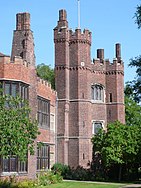Gainsborough Old Hall
| Gainsborough Old Hall | |
|---|---|

Old Hall Tower
|
|
| Coordinates | 53°24′02″N 0°46′39″W / 53.400657°N 0.777578°WCoordinates: 53°24′02″N 0°46′39″W / 53.400657°N 0.777578°W |
| OS grid reference | SK8132090012 |
| Built | 1471- 84 |
| Architectural style(s) | Tudor |
|
Listed Building – Grade I
|
|
| Designated | 4 April 1964 |
| Reference no. | 196291 |
Gainsborough Old Hall in Gainsborough, Lincolnshire is over five hundred years old and one of the best preserved medieval manor houses in England.
The hall was built by Sir Thomas Burgh in 1460. The Burghs were rich, flamboyant and powerful people. Gainsborough Old Hall was not only their home, but also a demonstration of their wealth and importance. Sir Thomas was a great benefactor to Newark Church and also the founder of the Chantry and Alms House at Gainsborough. In 1470, the manor was attacked by Sir Robert Welles over a clash about lands, status, and honour, but it was not severely damaged. It was in 1484, that Sir Thomas entertained King Richard III in his hall.
In 1510, Sir Thomas Burgh's son, Edward Burgh, 2nd Baron Burgh, was incarcerated at the Old Hall after being declared a lunatic. Sir Edward died in 1528, leaving his eldest son Sir Thomas as head of the family. In 1529, his son and heir, Sir Edward, married Catherine Parr, later Queen consort to King Henry VIII. The couple would stay at Gainsborough Old Hall until 1530; when they were granted their own manor in Kirton-in-Lindsey.
King Henry VIII visited Gainsborough twice; once in 1509 and again in 1541 with the doomed Queen Catherine Howard. The Queen was accused of indiscretions both at Gainsborough and Lincoln and she was executed. Catherine Parr, by this time a widow, became Henry's sixth wife.
When Thomas, the Fifth Lord Burgh died without an heir, the Hall was sold in 1596 to William Hickman, a merchant from London, who made many improvements, especially to the east wing. William and his mother Rose supported John Smyth and the Separatist movement, and allowed them to meet and worship at the hall from 1603 until they sailed to Holland to find religious freedom. The Hickman family continued to play a prominent role in the development of Gainsborough and many became local members of parliament. It was Sir Neville Hickman who invited John Wesley to preach in the Great Hall several times in 1759, and in 1761 and 1764.
...
Wikipedia

